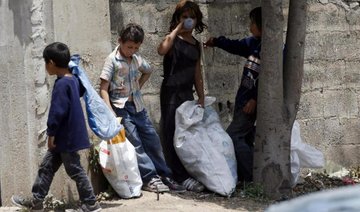AZRAQ REFUGEE CAMP, Jordan: A job center opened Sunday in Jordan’s second largest camp for Syrian refugees, the latest sign of an EU-backed policy shift meant to improve the lives of the displaced in regional host countries and discourage them from migrating onward.
Dozens of refugees crowded around long tables in a community center in the Azraq camp to register with potential employers for jobs in factories and on farms.
“Any work is OK for me,” said Sumaya Mohammed Jidaa, a 39-year-old widow and mother of six inquiring about a sewing job. “Just give us money to take care of our children.”
Under the so-called Jordan Compact, a deal struck with donor countries in 2016, the kingdom promised to provide 200,000 work permits for Syrians over three years, in exchange for several billion dollars in development assistance and reduced tariff barriers on Jordanian exports to Europe.
Implementation has been slow because of Jordan’s economic downturn, high unemployment and the slow pace of regulatory change. About 90,000 Syrians have obtained work permits so far, and only two factories are exporting goods to Europe under the new rules, officials said.
“You cannot expect the private sector to simply make use of a trade agreement if the proper support is not being provided,” said Patrick Daru, country coordinator of the International Labor Organization.
The job center is a project of the ILO, the UN refugee agency and Jordan’s Labor Ministry.
Jordan has been struggling with the fallout from prolonged conflict in neighboring Syria and Iraq, leading to unemployment of about 18 percent, with twice that rate among the young.
At the same time, the kingdom has more than 300,000 registered foreign workers and up to one million unregistered ones, according to the Ministry of Labor. Most are Egyptian and South Asian migrants in low-skilled jobs like domestic care, construction and agriculture.
The government has attempted labor reform, but many Jordanians disparage the manual labor traditionally performed by migrant workers, leaving a gap that Syrian refugees may now partially fill.
Job creation is Jordan’s central problem, Daru said.
“It’s a problem of investment. It’s a problem of getting European companies to source from Jordan, and this is the main game-changer,” he said.
At the job fair, Emad Hussein offered jobs for up to 100 refugees, hoping that by hiring them his textiles company will become eligible for reduced European tariffs. Hussein said he currently employs 700 Jordanians, 1,700 South Asians and two refugees.
“It’s less expensive to hire Syrians because we don’t have to pay meals and accommodations for them,” he said. “Even if there’s no European customers, we still need Syrians. We have to help people because of humanity, and we know they have experience.”
The job center, supported in part by the Dutch Embassy, contributes to the goal of keeping refugees as close to home as possible, said Dutch Ambassador Barbara Jozaisse.
“At least people now can apply for a job and earn their own income, so you have some dignity, you have pride, you have income, you can continue building your life and developing yourself and your family,” she said.
The Syria conflict, which erupted in 2011, has displaced millions of people, including some 5.5 million who fled civil war in their homeland. Jordan hosts about 660,000 registered Syrian refugees, though Jordanian authorities say the actual number of Syrians in the country is twice as high.
Job center for Syrians opens in Jordan refugee camp
Job center for Syrians opens in Jordan refugee camp

Turkiye evaluating potential measures in event of Iran-US conflict, source says

- Iran and the United States resumed negotiations earlier this month as Washington builds up military capability in the Middle East
ANKARA: Turkiye is evaluating all aspects of potential measures that may be taken in the event of a conflict between its neighbor Iran and the United States, a Turkish diplomatic source told Reuters on Wednesday.
Iran and the United States resumed negotiations earlier this month as Washington builds up military capability in the Middle East. Iran has threatened to strike US bases in the region if it is attacked, but Tehran’s top diplomat said on Tuesday that a deal with the US was “within reach” if diplomacy is prioritized.
NATO member Turkiye, which shares a border with Iran to its east, has said it opposes any military intervention on Iran and does not want destabilization in the region. Ankara has been in contact with both sides to de-escalate tensions and called for a resolution of issues through diplomacy.
“Naturally, all aspects of the measures that could be taken in the event of a negative development are being evaluated,” the source said, speaking on condition of anonymity.
“All scenarios are being considered; and steps that can be taken to ensure the safety of our citizens are being worked on,” the person said, but added any steps that would “violate Iran’s sovereignty” were “out of the question.”
The source did not provide details on what measures Turkiye was evaluating.
Earlier, the Turkish presidency’s office for countering disinformation denied media reports that Turkiye was planning to enter Iranian territory to stop a potential influx of refugees.














